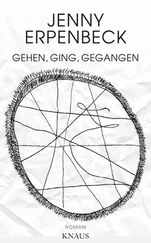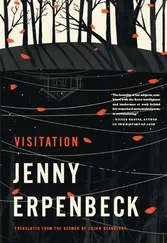Jenny Erpenbeck - The End of Days
Здесь есть возможность читать онлайн «Jenny Erpenbeck - The End of Days» весь текст электронной книги совершенно бесплатно (целиком полную версию без сокращений). В некоторых случаях можно слушать аудио, скачать через торрент в формате fb2 и присутствует краткое содержание. Год выпуска: 2014, Издательство: New Directions Publishing, Жанр: Современная проза, на английском языке. Описание произведения, (предисловие) а так же отзывы посетителей доступны на портале библиотеки ЛибКат.
- Название:The End of Days
- Автор:
- Издательство:New Directions Publishing
- Жанр:
- Год:2014
- ISBN:нет данных
- Рейтинг книги:4 / 5. Голосов: 1
-
Избранное:Добавить в избранное
- Отзывы:
-
Ваша оценка:
- 80
- 1
- 2
- 3
- 4
- 5
The End of Days: краткое содержание, описание и аннотация
Предлагаем к чтению аннотацию, описание, краткое содержание или предисловие (зависит от того, что написал сам автор книги «The End of Days»). Если вы не нашли необходимую информацию о книге — напишите в комментариях, мы постараемся отыскать её.
The End of Days — читать онлайн бесплатно полную книгу (весь текст) целиком
Ниже представлен текст книги, разбитый по страницам. Система сохранения места последней прочитанной страницы, позволяет с удобством читать онлайн бесплатно книгу «The End of Days», без необходимости каждый раз заново искать на чём Вы остановились. Поставьте закладку, и сможете в любой момент перейти на страницу, на которой закончили чтение.
Интервал:
Закладка:
Two pounds of butter, he repeats, looking at her, fifty decagrams of veal, ten candles.
He says her price right to her face.
And why not twelve candles, she says and starts to laugh.
The time when it went without saying that the freshly fallen snow would promptly be carted from the streets of the Viennese city center to the Danube and dumped into the channel that had been knocked clear of ice is long past. Thanks to the war, something is missing: men, the freshly fallen men. The most that happens now is that the snow gets pushed aside, shoveled into heaps by a couple of war invalids, women and children; on warmer days these heaps of snow begin to melt until they are ringed with puddles that freeze over during the night in precisely those spots where the path was to remain clear. The layer of ice covering the sidewalks of Vienna, in heavily traveled spots above all, has grown so hard and thick in the course of the winter that no one even tries to chop it up any longer. Pedestrians wishing to cross from Babenberger Strasse to the Museum of Fine Arts or to walk down Burgring on the left away from the city center must take particular care not to fall. Captain Eduard Gabler, for instance, suffered a compound fracture of his forearm just yesterday when he fell on the ice walking at Freudenauer Winterhafen; Private Franz Adler also broke his forearm, on Marxergasse; factory owner Mortiz Gerthofer suffered an exposed fracture of his right shin on Nobilegasse; and nurse Frieda Bertin fell on Mariahilfer Strasse, not at all far from here, suffering a severe contusion of the left hip. Where one crosses Babenberger Strasse toward the Art History Museum, away from the city center, the ice between two heaps of snow has long since been polished smooth by the heavy pedestrian traffic, even though yesterday’s snowfall briefly covered it up. But because of the countless shoes, and also several bare feet, that have passed over this spot since then, the snow has become inseparably conjoined with the ice over the course of the morning, itself becoming ice. This ice appears black — though of course there is no deep body of water beneath its surface — and it displays the approximate contours of the African continent on a smaller scale. Seamstress Cilli Bujanow nearly slipped on this bit of ice around 2:30 in the afternoon, but was propped up by Lieutenant Colonel of the Chamber of Finances Alfred Kern, who happened to be walking behind her, sparing her the fall. Seven-year-old Leopoldine Thaler practiced skating on the puddle as she passed, eleven-year-old pupil David Robitschek attempted to shatter the ice by jumping up and down on it (unsuccessful), a stray dog of unknown provenance urinated on the right-hand heap of snow, causing a portion of the ice, corresponding roughly to the region of former German East Africa, to melt and also dyeing the area yellow approximately as far down as the Niger. By six, this bit too has frozen again, although the surface of the ice in this area is slightly roughened. The young lady who at approximately 6:00 p.m. at first considers crossing Babenberger Strasse here and then walking to the left toward of the Museum of Fine Arts would be compelled — before reaching the rougher area north of the Equator that promises salvation in the form of a firm foothold — to step on the treacherously slippery territory of South Africa, but at the last minute, she loses her nerve, and instead heads off to the right in the direction of Opernring.
So you aren’t one after all, the pale lad asks long after she has stopped laughing. No, she says. She’s surprised at how hard the young man is sweating even though he doesn’t have his coat buttoned. She wouldn’t mind being cheap if it meant she wouldn’t be on her own forever with all the time in the world. How many people can simultaneously be in possession of all the time in the world? Would she like to.? She decides to join him for a glass of wine. That is. She has no idea how grateful. In the café he seizes her hands and holds them to his face, using them to wipe the tears from his eyes and the mucus from his nose, perhaps she’ll excuse him, he’s never been with one before, but just now he wanted, perhaps she will understand, you see his fiancée just, that is, no longer, and sent him packing, although for two years now, an engagement after all, or doesn’t that mean.
How long does a life last, anyhow?
Seventy or eighty years?
Doesn’t she already know more than she can bear?
. his fiancée would see all right if he carried on just like she did, preferably with lots of girls. really, though, someone ought to kill her.
Oh dear, the young woman thinks, her hands already dripping with tears. Does he know her, this man? Does he know what she has wished for? Does he know what a burden she is finding life, which from inside always looked to her like a sphere with perfectly smooth, black walls, and you keep running and running and there isn’t even a shabby little door to let you out?
He’d have shot her if only she’d come out of her building, he says. But she knew what he was capable of, so she stayed where she was, and what was he supposed to do now. he never thought. after all he was. and he’d always treated her. and never once. He’d have shot her? she asked. How?
Right here, he says, slipping his fingers into the right-hand pocket of his coat, it’s my father’s Mauser.
Now all at once she understands why she is sitting here with this man, on whose face what goes by the name of heartache — in her own case, too — makes so pitiful an impression. Now the inside of the sphere that always seemed infinite to her suddenly contains this shabby little door. You know what, she says, pulling her hands away from the sobbing man, it would be the easiest thing in the world to insult your fiancée in a way she will remember all her life. Really? he says, looking up, and meanwhile she is drying off her hands on her skirt under the table.
Her mother says: I’m going to bed now, she gathers up her sewing things, puts them back in their basket, brings the basket back out to the cold parlor. Her father calls: I’m coming, too. Her sister has already been lying in bed for half an hour, but despite the darkness she’s still awake. Her father picks up the carbide lamp by its handle.
Do you really think? he says.
Of course.
And if something goes wrong?
They’ll certainly know what to do on Alserstrasse if anything goes wrong.
Healing and Comfort for the Sick.
And if everything goes right, she thinks, we’ll soon enough be continuing our journey on the quietest car of the New Viennese Tramway Society.
All right, I’m going to call her and tell her.
But just one sentence.
Just one sentence.
He settles up, she says goodbye to the waiter, that’s how easy it is to pass from one world to the next. The telephone booth is just across the street, and when the youth puts his weight on the floor of the booth, the light goes on — a soul would be telephoning in the dark, she thinks. Just one sentence. She waits outside in the snow, watching the lovesick young man speaking in the light: he speaks, listens, responds again, listens, contradicts. She’d better drag him back out of this cell, otherwise he might slide back over to the other side again; the glass panes of the booth are already fogging up with his hot breath when she pulls open the door.
In the receiver a female voice is exclaiming: For the love of God, speak with my daughter tomorrow!
Tomorrow will be too late!
But I’m telling you she isn’t here!
Please tell her that even in death I was —
You still have your whole life ahead of you!
Now he falls silent. He says nothing at all. His hair is thin, at twenty-five, he might already have a bald spot. Then she calmly takes the receiver from his hand, and in his place she says into it:
Читать дальшеИнтервал:
Закладка:
Похожие книги на «The End of Days»
Представляем Вашему вниманию похожие книги на «The End of Days» списком для выбора. Мы отобрали схожую по названию и смыслу литературу в надежде предоставить читателям больше вариантов отыскать новые, интересные, ещё непрочитанные произведения.
Обсуждение, отзывы о книге «The End of Days» и просто собственные мнения читателей. Оставьте ваши комментарии, напишите, что Вы думаете о произведении, его смысле или главных героях. Укажите что конкретно понравилось, а что нет, и почему Вы так считаете.












